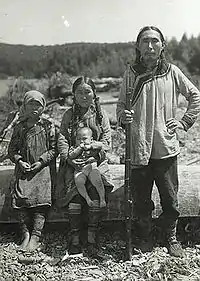Udege people
Udege (Удэгейцы in Russian; ethnonym: удиэ and удиһе, or Udihe, Udekhe, and Udeghe correspondingly) are a people who live in the Primorsky Krai and Khabarovsk Krai regions in Russia, the native population of this region. They live along the tributaries of the Ussuri, Amur, Kungari, and Anyuy Rivers. The Udege speak the Udege language, which belongs to the Tungusic language family. Their religious beliefs include animism, animal worship, and shamanism. The Udege are mainly engaged in hunting, fishing, and ginseng harvesting. According to the 2002 census, there were 1,657 Udege in Russia, a slight increase from 1,500 in 1970. According to the 2010 census there were 1,496 Udege in Russia. They are one of the closest ethnic groups to the Manchu and Nanai, and are possibly of Jianzhou Jurchen origin.
 | |
| Total population | |
|---|---|
| 1,538 (2002–2010) | |
| Regions with significant populations | |
| Russia: Khabarovsk Krai, Primorsky Krai | |
| 1,496[1] | |
| 42[2] | |
| Languages | |
| Religion | |
| Shamanism | |
| Related ethnic groups | |
| Nanai people, Oroch people, and other Tungusic peoples | |
| History of the Priamurye region |
|---|
| also including Heilongjiang, Amur Oblast and southern part of Khabarovsk Krai |
|
Udege biggest settlements are in:
- Khabarovsk krai: Gvasiugi (Imeni Lazo District) and Arsenievo (Nanaysky District)
- Primorsky kra: Agzu (Terneysky District), Krasny Yar and Olon (Pozharsky District)
Since the advent of Perestroika, the Udege, led by Pavel Sulyandziga, have been actively involved in the struggle for control over their traditional territories along the Bikin River. A central objective has been the establishment of a Territory of Traditional Natural Resource Use of federal status, which was proposed in cooperation with the national umbrella organisation RAIPON and the Russian Institute of Anthropology and Ethnography but failed to be approved by the authorities.[3]
Out of 40 Udeges living in Ukraine, only 8 declared Udege as their native language. Most of the Udeges in Ukraine indicated Russian (19) or Ukrainian (6) as their native language. 7 of them named another language.[2]
External links
| Wikimedia Commons has media related to Udeghe. |
- Maksim Russo. Map of languages of Russia: Udege (Polit.ru, 10 марта 2019)
- Russian Census 2010: Population by ethnicity (in Russian)
- State statistics committee of Ukraine - National composition of population, 2001 census (Ukrainian)
- Discrimination against indigenous small-numbered peoples of the North, Siberia and the Far East of the Russian Federation. (Parallel report submitted to the UN Committee for the Elimination of Racial Discrimination, RAIPON, June 13, 2008)
